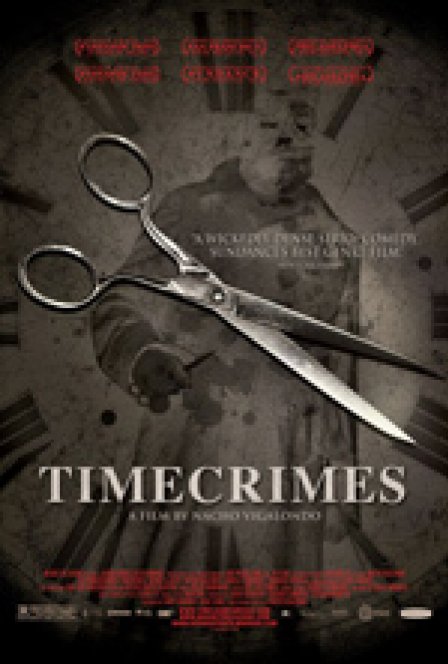Nacho Vigalondo’s time travel thriller, Cronocrímenes (Timecrimes), begins as the main character, Hector (Karra Elejalde), and his wife, Clara (Candela Fernandez), move into a new house in a verdant Spanish suburb. The first 10 minutes of stilted spousal affection reveal that Hector and Clara have one of those generically happy movie marriages that exist only to be disrupted. And sure enough, no sooner has Hector lifted his binoculars to his face (I guess he’s supposed to be a birdwatcher, or something) than he spies a woman stripping in the woods, goes to investigate, gets stabbed in the arm by a scary guy with a bandaged face, and is chased into a time machine. When Hector emerges, an hour earlier, he is, of course, advised by the surprised scientist who created the machine not to do anything lest he mess with time.
At this point in the film, Cronocrímenes feels pretty formulaic. But Vigalondo eschews the easy time travel plot device that has the protagonist disturbing the all-important timeline—by, for instance, stepping on some evolutionarily important critter, or running into his own grandpa and causing him to miss his date with the protagonist's grandma—and spending the rest of the film trying to “fix time.” Instead, everything Hector does that seems like it ought to mess up the chain of events (e.g., phoning his past self) ends up becoming integral to preserving it. Pretty soon, Hector realizes that each of his time-traveled incarnations is already inextricably implicated in these events and that he has to do some unexpected and nasty things if he wants everything to work out, causality-wise.
Ninety percent of what’s fun about Cronocrímenes is watching causes and effects link up in unexpected ways. I can’t give examples of this without ruining the movie for you, so suffice to say, by the end of the film there have been several iterations of Hector, and each one interacts with the others in increasingly surprising and delightful ways.
Vigalondo makes sure we see just how events fit together, too. He frequently has Hector and the scientist explain what’s happened so far, employing washed-out flashbacks and all. But because Hector has usually just popped out of the time machine, and the scientist has therefore just seen Hector for the first time, these recapitulations feel pretty organic, and I never bristled at having Vigalondo hold my hand and walk me through the plot.
The flashbacks don’t work as well when Vigalondo uses them to explain Hector’s actions. Whenever Hector does something inexplicable, Vigalondo tries to elucidate it by flashing back to a previous conversation that the character is presumably thinking about. It’s a clumsy way to communicate motivations, and, worse, it’s not at all enlightening.
Characterization is bound to be a problem in a film whose protagonist is alone most of the time, but even if we account for that, Vigalondo seems especially unconcerned with his characters. Cronocrímenes feels like a cool short-film concept that’s been fleshed out to 88 minutes without any resultant embellishment of characters. (Since the movie is a short-film director's first feature-length project, this makes sense.)
At the very least, Cronocrímenes may provide ample fodder for a more experience auteur. Online rumor has it that United Artists has purchased rights for an American remake of the film and that David Cronenberg is on the shortlist of potential directors.
But even in the film's current incarnation, I was able to appreciate Hector’s blankness as a character: It allowed me to project myself onto him even as he did some really disturbing things. This gave the film more psycho-emotional weight than it might have otherwise had. Cronocrímenes is meticulously, and intricately, crafted. It has some fantastic reversals. And for that, I’m more than willing to overlook the flatness of its characters.

